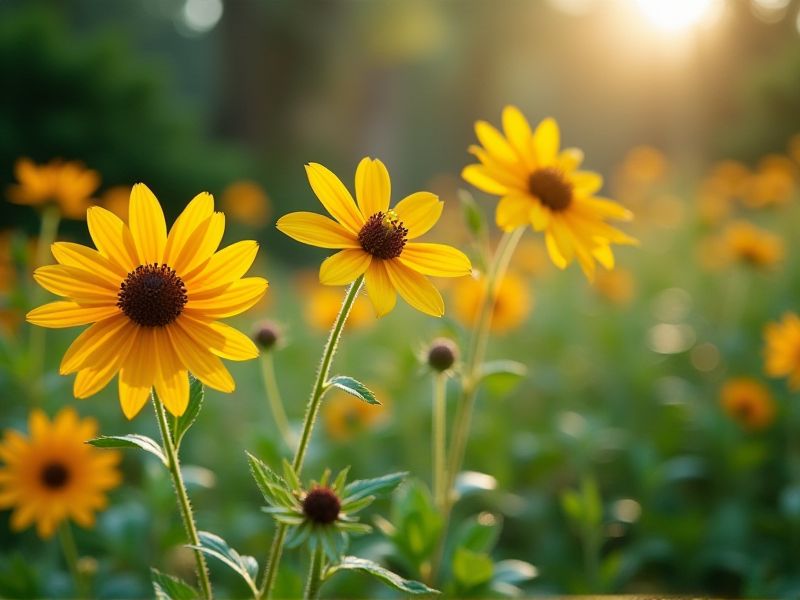
Choosing deer-resistant garden plants can enhance your landscape while minimizing browsing damage. Popular options include lavender, known for its aromatic foliage and vibrant purple flowers that deer typically avoid, and rosemary, a hardy herb with a robust scent. Consider incorporating yarrow, which features feathery foliage and clusters of yellow or white blooms, making it less appealing to deer. Ornamental grasses, such as blue fescue, offer an attractive texture and are generally ignored by these herbivores. By selecting these plants, you can create a stunning garden that thrives despite deer presence.
List of some Garden plants that are deer-resistant
- Lavender (Lavandula)
- Marigold (Tagetes)
- Catmint (Nepeta)
- Lamb's Ear (Stachys byzantina)
- Foxglove (Digitalis)
- Russian Sage (Perovskia atriplicifolia)
- Yarrow (Achillea)
- Bleeding Heart (Dicentra)
- Butterfly Bush (Buddleja)
- Coneflower (Echinacea)
Important things about Garden plants that are deer-resistant
Native Plant Selections
When designing a garden with native plants that resist deer, consider species like Coneflower (Echinacea purpurea), which not only attracts pollinators but also boasts tough, spiky petals that deter browsing. Other excellent choices include the aromatic Lavender (Lavandula), known for its strong scent that typically repels deer, making it a delightful addition to your landscape. For ground cover, consider planting Creeping Thyme (Thymus serpyllum), as its low-growing nature and savory scent are unappealing to deer while providing a lush green carpet. Incorporating these native plants into your garden ensures a vibrant ecosystem that thrives with minimal deer interference.
Strong Aromatic Foliage
Choosing garden plants with strong aromatic foliage can naturally deter deer while adding enchanting scents to your landscape. Herbs like lavender, rosemary, and sage emit powerful fragrances that not only enhance your culinary experience but also repel these herbivores. Other deer-resistant options include ornamental sages and scented geraniums, which thrive in various soil types and provide a lasting aroma throughout the growing season. Incorporating these plants into your garden ensures a beautiful, fragrant space while keeping deer at bay.
Thorny Or Spiky Textures
Incorporating thorny or spiky textures in your garden can effectively deter deer and enhance visual interest. Plants such as Barberry (Berberis) and Holly (Ilex) feature sharp thorns that not only provide a natural barrier but also attract birds and pollinators. Lavender (Lavandula) and Rosemary (Rosmarinus officinalis), while not thorny, possess a rugged texture that deer often avoid due to their aromatic properties. By selecting these resilient and deer-resistant plants, you can create a striking landscape that minimizes browsing damage.
Toxicity To Deer
Many garden plants are known for their deer-resistant properties, providing a beautiful landscape while safeguarding your plants from herbivorous threats. Examples of such plants include lavender, with its aromatic oils that deter deer, and the tough, spiky foliage of barberry. Ornamental grasses, like blue fescue, not only add texture but are also less appealing to deer due to their unpalatable leaves. Incorporating these plants into your garden design can significantly reduce deer browsing, helping to maintain your garden's health and vitality.
Low Moisture Requirements
Carefully selecting garden plants that thrive in low moisture conditions can create a sustainable landscape while minimizing deer activity. Options such as lavender, sage, and Russian sage not only require minimal watering but also emit scents that deter deer from approaching. Native drought-tolerant plants like yarrow and purple coneflower contribute to a resilient garden that attracts beneficial pollinators. By incorporating these plants, you can cultivate an eye-catching yet low-maintenance garden that thrives on minimal resources.
Drought-Tolerant Species
Drought-tolerant plants such as lavender, sage, and rosemary not only conserve water but also thrive in dry conditions, making them ideal for sustainable gardens. These species often emit strong fragrances that deter deer, providing a natural pest-resistant solution for your garden. Succulents like agave and sedum also offer excellent drought resilience while appealing visually with their unique shapes and textures. By incorporating these deer-resistant, water-saving plants into your landscape, you create an attractive and low-maintenance environment that supports biodiversity.
Distasteful Flavors
Certain garden plants are naturally distasteful to deer, making them excellent choices for maintaining your landscape. Plants such as lavender, sage, and rosemary contain strong aromas and flavors that deter these grazers, ensuring your garden remains intact. Additionally, marigolds and barberry plants possess qualities that make them unappealing to deer, further enhancing your garden's resistance. Consider incorporating these robust species into your garden design to protect your plants while adding vibrant colors and diverse textures.
Seasonal Flowering Patterns
Deer-resistant garden plants showcase a variety of seasonal flowering patterns, making them ideal for any landscape. In spring, vibrant blooms from Azaleas and Daffodils bring life and color, while summer sees the emergence of Echinacea and Allium, attracting beneficial pollinators. As the fall months approach, you can enjoy the late-season splendor of Asters and Sedums, providing visual interest long after other plants have faded. Choosing these resilient species not only enhances your garden's aesthetic appeal but also reduces the risk of deer damage.
Dense Growth Habits
Selecting garden plants with dense growth habits can effectively deter deer from invading your landscape. Species such as Barberry, Juniper, and Boxwood offer a lush, thick foliage that not only enhances your garden's aesthetics but also makes it less accessible to deer. These plants are known for their resilience and low maintenance, thriving in a variety of soil types while providing shelter for beneficial wildlife. Incorporating these deer-resistant options into your garden design will not only protect your plants but also create a vibrant, healthy environment.
Integrated Pest Management
Selecting deer-resistant garden plants is vital for maintaining a thriving landscape while minimizing damage from wildlife. Some effective options include **lavender**, **rosemary**, and **sage**, which not only deter deer due to their strong scents but also attract pollinators. Additionally, native plants like **coneflowers** and **black-eyed Susans** provide a colorful display without drawing in herbivorous visitors. Incorporating these choices into your garden will enhance its beauty while reducing the need for chemical repellents, creating a more sustainable environment.
